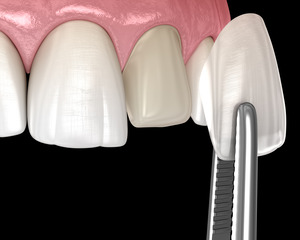Do Veneers Make Your Teeth Sensitive?
August 27, 2024

Veneers are a popular cosmetic dental solution for those looking to enhance their smile. They can dramatically transform the appearance of teeth, correcting issues like discoloration, chips, and gaps. However, a common concern among those considering veneers is whether they will cause tooth sensitivity. Here’s what you should know about the potential for sensitivity with veneers, what causes it, and how to manage it if it occurs.
Understanding Veneer Placement and Sensitivity
When veneers are applied, a small amount of enamel is typically removed from the front surface of the teeth to make room for the veneer. This process is essential for ensuring a natural fit and appearance. However, enamel is the protective outer layer of your teeth, and removing even a small portion can expose the underlying dentin, which is more sensitive. As a result, some individuals may experience temporary sensitivity to hot or cold foods and drinks after the procedure.
The level of sensitivity varies from person to person. Some may not notice any difference, while others could experience a significant increase in sensitivity. This is often dependent on the amount of enamel removed and the individual’s natural sensitivity levels.
Temporary vs. Long-Term Sensitivity
It’s important to distinguish between temporary and long-term sensitivity when it comes to veneers. Temporary sensitivity is common immediately after the procedure. This discomfort is typically mild and should subside within a few days to a couple of weeks as your teeth adjust to the new veneers. During this time, you might feel a slight twinge when eating or drinking something very hot or cold, but this should gradually decrease.
Long-term sensitivity, on the other hand, is less common. If you experience persistent sensitivity that lasts for months, it could indicate an issue with the fit of the veneers, or it might be a sign of an underlying dental problem. In such cases, it’s crucial to consult your dentist, who can evaluate the situation and make any necessary adjustments or provide further treatment.
Managing Sensitivity After Veneers
If you do experience sensitivity after getting veneers, there are several steps you can take to manage it. Using a toothpaste designed for sensitive teeth can help by gradually reducing sensitivity over time. Avoiding extremely hot or cold foods and beverages, at least initially, can also prevent discomfort. In some cases, your dentist may recommend a fluoride treatment or a desensitizing agent to help strengthen the enamel and reduce sensitivity.
About the Author
Dr. Chitra P. Naik has been helping patients to truly love their smiles for around 30 years. She finds it enormously rewarding to not only make their teeth shine, but to improve the function and feel of their smile. Dr. Naik initially studied dentistry at the Government Dental College in Mumbai, India. She then moved to the U.S., where she received her dental degree from the Pennsylvania School of Dental Medicine.
If you have any questions about veneers, she can be reached at her website or by phone at (810) 235-5422.
No Comments
No comments yet.
RSS feed for comments on this post.
Sorry, the comment form is closed at this time.
